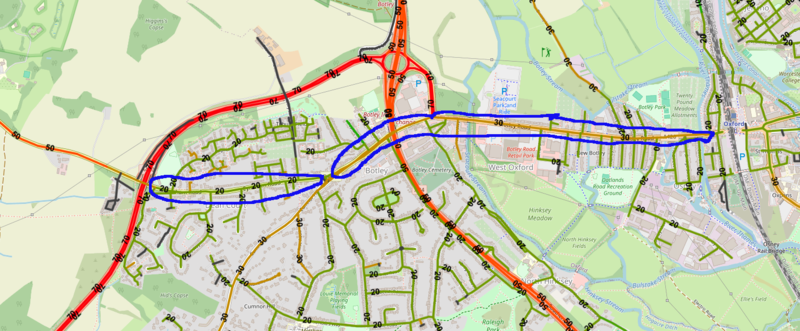The failure to make Oxford's main roads 20mph is a black spot on Oxfordshire's otherwise successful 20mph speed limit roll out. If one were to pick the roads which need 20mph limits most, it would be roads inside Oxford such as Botley Rd, Woodstock Rd and Banbury Rd, because they have very large numbers of people walking and cycling both along and across them, with clear collision hotspots at pretty much every minor road junction. Making Oxford's remaining roads 20mph is an essential step to achieving both Vision Zero and the county's cycling targets, but it is also the single most effective public health intervention within the county's power.
There is really solid evidence of the effect 20mph speed limits have on collisions and injuries. A recent study of six European cities that introduced 30km/hr (20mph) limits found that: "the measure has produced desired effects, such as lower speeds, high levels of compliance, reduced noise and local pollution, no increase in travel time or congestion for vehicular traffic, and significantly fewer accidents, especially serious ones and those involving pedestrians and cyclists". And a study of 20mph speed limits on Transport for London's main road network - which seems a good match for Oxford's main roads - found similar results, with a 36% decrease in collisions involving vulnerable road users and a 25% decrease in deaths and serious injuries.
The public health gains from increased physical activity probably exceed those from the reduction in collisions and injuries: long-term chronic diseases such as type two diabetes and arthritis have a huge impact on quality of life and are an increasing burden on the NHS: "the health benefits of 20mph are far, far greater than casualty savings alone. They include increased physical activity, and therefore less obesity, less stress and less anxiety, as well as other health benefits such as reduced noise and air pollution."
The evidence on noise pollution was compelling enough that the city of Lausanne (slightly smaller than Oxford) has somewhat counterintuitively reduced speed limits to 30km/hr overnight (between 10pm and 6am). "Noise reduction due to the 30kmph [20mph] speed limit was estimated to annually prevent 1 cardiovascular death, 72 hospital admissions from cardiovascular disease, 17 incident diabetes cases, 1,127 individuals being highly annoyed and 918 individuals reporting sleep disturbances from noise."
I was initially unconvinced of the merits of 20mph speed limits without infrastructure changes, but my personal experience on Iffley Rd and the quantitative evidence from elsewhere has changed my opinion on this completely. Even without infrastructure and with almost no enforcement, speeds are significantly down on Iffley Rd (according to both my experience and county data, and despite parking removal that would have been expected to speed traffic up) and the highest speeds are down most: most people used to drive at over 30mph when able to, now few do.
Lower traffic speeds affect the whole way people interact with the environment. The pedestrian crossings on Iffley Rd are easier to use since the reduction in speed limit there, with better driver compliance with both zebra and signal-controlled crossings, and the whole road feels less "energetic". (I am training an 11 year old who will be cycling by herself soon, and the right-turns onto or off Woodstock or Banbury Rd are scarier than those on Iffley Rd not just because faster cars make judging gaps harder but because of how much worse any collision is likely to be.)
 But we now have the anomalous situation where coming into Oxford from Farmoor there is a 20mph speed limit on the Eynsham Rd between the A420 and West Way — a road which is built up and should be 20mph, but which has relatively few side entries and little "exchange" across it — but the speed limit then goes up to 30mph on West Way and Botley Rd — where there are far more people walking and cycling, and lots of both cycling and driving turning movements, with the entries to the park and ride, Waitrose, the retail parks, Osney Mead, and so forth. (The Road Safety Audit of the last set of works on Botley Rd recommended making it 20mph.)
But we now have the anomalous situation where coming into Oxford from Farmoor there is a 20mph speed limit on the Eynsham Rd between the A420 and West Way — a road which is built up and should be 20mph, but which has relatively few side entries and little "exchange" across it — but the speed limit then goes up to 30mph on West Way and Botley Rd — where there are far more people walking and cycling, and lots of both cycling and driving turning movements, with the entries to the park and ride, Waitrose, the retail parks, Osney Mead, and so forth. (The Road Safety Audit of the last set of works on Botley Rd recommended making it 20mph.)
The coming traffic filters make the need for 20mph speed limits everywhere in Oxford even more urgent. The London Congestion Charge increased both collision risks and collision severities by increasing traffic speeds: "the marginal driver along congested roads decreases the risk and severity of traffic collisions for other road users by slowing others down". The traffic filters are likely to result in significantly faster moving motor traffic on the inner sections of the 30mph radials, just where that will create the most danger for people walking and cycling.
